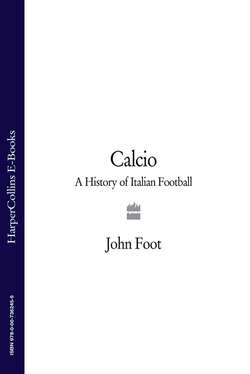Читать книгу Calcio: A History of Italian Football - John Foot - Страница 44
Duce, Duce! Fiorentina-Cagliari. Serie A. 12 October 1969
ОглавлениеFiorentina were reigning champions, and began the 1969–1970 season in sparkling form, extending their unbeaten run to 29 games. Cagliari, surprisingly, were one of the main challengers for the scudetto that year and the clash before a packed crowd in Florence in October 1969 was between the top two teams in the championship. Cagliari won the game with a controversial penalty, 1–0, after Lo Bello turned down two penalty appeals for Fiorentina, and disallowed an equalizing goal three minutes from the end of the match for a marginal offside. He also sent off Florence star Amarildo and a Cagliari player for fighting. It was his 261st game in charge in Serie A.
The Florence public did not take kindly to these decisions. Towards the end of the game a familiar, rhythmical chant rang around the stadium, directed at the referee. The meaning of the slogan harked back to the fascist era: Du-ce, Du-ce. Lo Bello was a dictator, an authoritarian referee, a fascist. Bottles were thrown onto the field, a fight broke out in the tunnel and Lo Bello was trapped inside the changing rooms for a couple of hours. The referee and linesmen were escorted from the ground in a police van and the Cagliari bus was stoned. The post-match reports had little to do with the game itself. Instead, they concentrated on one man. ‘Lo Bello has “written” the championship table’, screamed the Corriere della Sera. Leading sports journalist Gino Palumbo wrote that the game had been ‘a show, with only one star’. The story of the game was ‘the story of how a referee, when he so desires, can become the master of a match and conduct it as he sees fit, challenging the rules, regulations, the players and the fans’, he continued. ‘This is not a report on Fiorentina-Cagliari, this is a report on the one-man show which Concetto Lo Bello performed on Florence’s ground.’ However, Palumbo also praised Lo Bello’s ‘courage’ on the pitch.
Fiorentina paid heavily for the incidents during and after the match. They had to play their subsequent home games elsewhere and lost their next away fixture 5–1. The club was also fined for the ‘Duce’ chants – which were described as ‘derisive comments’.23 It could be argued that the whole fiasco cost Fiorentina a second successive championship, while the Sardinian club went on to win the scudetto. On his return to Florence the following week – for a referees’ meeting – Lo Bello was given a two-man guard at the city station. As with many Italian footballing controversies, the Lo Bello ‘case’ also crossed over into Parliament. A Christian Democrat deputy argued in the debating chamber that the ‘power’ of referees should be limited. Florence fans took refuge in conspiracy theories – ‘they won’t let us win two championships in a row’ – and threatened a fans’ strike. Journalists and football commentators complained about the ‘excessive influence’ exercised by Lo Bello over the outcome of games, and wondered for how long this trend could continue.
None of this had any effect on Lo Bello’s style. In his next Serie A game, at Vicenza, he ‘identified’ a spectator who had insulted him ‘repeatedly’ from behind the goal, and had his name taken by a plainclothes policeman. The spectator, Walter Giuliani, a 56-year-old lorry-driver, denied the charge, but Lo Bello sued him for defamation. The referee added that Giuliani was ‘not a football fan, but someone who wanted simply to attack me’. Lo Bello’s style led to a number of incidents similar to the Florence ‘riot’ through his long career. In 1948 he was forced to hide in the dressing room after a minor league game. Struck by a stone on the head, he carried on refereeing a game in 1957, and in 1971 he was saved by police in Turin, and chased in his car later, after sending off two Torino defenders. ‘The Prince’ left his mark on every game, and no referee since has dominated discussion or divided Italians in quite the same way. His authoritarian style was linked by some fans to the fascist era. Once again, the referee was associated – unfavourably – with aspects of the Italian state and its administrators.
